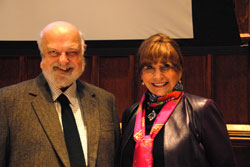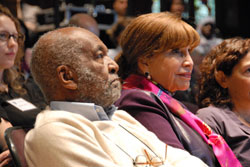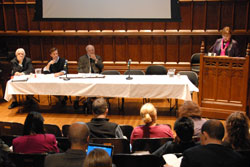Whither the Future of Anthropology in Education?
For more than half a century, anthropology and education have had a productive relationship. Ethnographic methods have enhanced understanding of how education happens, inside the classroom and outside, close to home and abroad.
TC has always been a leading voice in this exchange. Margaret Mead, who taught at the College from 1948 to 1960, was among the first to focus her field on American schools, and her young protégé, future TC president Lawrence Cremin, absorbed her vision of education as occurring not just in classrooms but in all the theaters of daily life.
All of which made the College the logical venue, in mid-October, for a two-day conference titled “The Future of Anthropology and Education” – a future that currently seems very much in question.
“Anthropology is disappearing as a focus in many education schools, and major foundations no longer back anthropological research in the classroom,” TC President Susan Fuhrman said in welcoming attendees from two-dozen institutions, including Stanford, Northwestern, McGill, Princeton, Oxford, and the University of Pennsylvania. Anthropology also is losing ground to the tidal wave of large-scale “Big Data”-driven projects that increasingly attract funds.
“It is not self-evident that our discipline and its approaches are sustainable,” said the conference’s convener, TC Professor of Education Herve Varenne. “We must figure out how to educate our audience about the power of what we do.” (Varenne has received the 2013 George and Louise Spindler Award, from the Council on Anthropology and Education, recognizing his lifetime achievement in the field.)
Many of the field’s central values hark back to the creation of the Council on Anthropology in Education in 1970. For example, Nancy Hornberger, outgoing editor of the Anthropology & Education Quarterly (AEQ), said that the journal’s mission “remains the same: to publish ethnographic studies on learning and teaching both in and out of school.”
“We want research that goes deeper than just talking to people,” Hornberger said, adding that long-term participant-observation is still what distinguishes the field. “But today submissions based on narrative and discourse analysis are growing," she said. "We need more systematic ethnographic accounts.”
But today submissions based on narrative and discourse analysis are growing, she said. The impact of digital media spaces on ethnography is an important new concern. The relationship between researchers and participants is in constant flux, partly due to new methods and partly due to constraints such as those imposed by institutional review boards. Meanwhile, Hornberger said, public schools and districts “are making it harder for teachers to feel free to have researchers in their classroom, and that is having an impact on our field.”
Another major challenge facing the field is how to influence policy and hold power structures accountable.
Peter Demerath, of the University of Minnesota, said that anthropologists should not speak in a private language, but “should speak as we do in public, be clear and lay out our arguments in terms of the conventional wisdom that they are responding to.” Instead, he said, Demerath added: “we need to get over our deep-seated fears of reductionism and our reluctance to generalize. Policy-makers need to hear unitary messages.”
In the conference’s final plenary, Jill Koyama, of the University of Arizona, called for anthropologists in education to speak out more and worry less about the precise institutional status of the sub-field.
“We’ve been so preoccupied with how anthropology of education came together, and is maintained together,” Koyama said. “I do not feel that anthropology needs to be in the service of education. Collaborate, integrate, critically inform – but do not subsumed.”
Koyama urged her colleagues to be forceful in asserting the role of anthropology in education, calling for more work on race and class, more critical scrutiny of the anthropologists’ own institutions, and more blogging and other public work, even when this is not encouraged or rewarded. “We have ourselves to blame for not being invited to the table,” Koyama said. “We need to get our voices out there.”
View video from “The Future of Anthropology and Education” conference.Published Monday, Nov. 25, 2013


